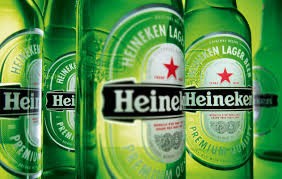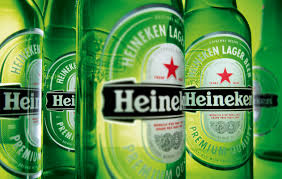
In a strategy that depends on broadening the sport’s appeal in Asia and persuading fans to pay more for their beer, Heineken is betting on Formula One to help it reclaim the title of leading global lager from Budweiser.
Rather than its higher-margin namesake lager, which it promotes at the Grand Prix, the sales boost was driven by its cheaper Singapore-based Tiger beer brand as Heineken saw significant growth in Asia over the past five years.
Heineken’s cheaper rivals Budweiser and Tuborg has also caught the fancy of Asian drinkers. Heineken brand sales fell 7.1 percent in the first half of 2017 and have grown more slowly in the region than globally for the past three years.
To cut reliance on lower-margin Europe, or North America, where craft brewers are muscling in, regions like Asia are needed by the Dutch brewer, Budweiser’s Belgian owner Anheuser-Busch InBev and Danish Carlsberg, which makes Tuborg.
The company has been left vulnerable to rivals selling “premium” products at a lower price as Heineken has ruled out an all-out scrap for market share. Although Asia had as many races as the sport’s heartland Europe in 2017, in a region where some countries have dropped the race, Formula One presents a risky choice.
200 million extra television viewers, many in Asia, will be brought into the fold of the race by the sponsorship, says the world’s second largest brewer, and the company had launched the sponsorship which it launched in September last year to supplement the Champions League soccer sponsorship it has had since 2005.
“For us in Formula One, every race with this level of hospitality is like a final,” Heineken brand director Gianluca Di Tondo said at the Italian Grand Prix, where Asian customers were among its guests.
Designed to make a mark in the world’s biggest market, of which Heineken has only a very small slice, was the Heineken Chinese Grand Prix in April, one of only three races to bear the Heineken name and extra branding.
the Dutch brewer believes consumers will ultimately pay a little more for the cachet of drinking its 150-year-old namesake brand even though Heineken costs 10-25 percent more in China than Budweiser, which is also marketed as high-end.
“We are a world brand, we are everywhere and we tend to have price points that are a bit higher and a bit more premium and we want to keep it like that,” Heineken chief executive Jean-Francois van Boxmeer said.
Beer consultants Plato Logic said that in a ranking excluding sales in home markets, Budweiser was helped to end a 30-year stretch for Heineken as the number one global lager last year largelyl by growth in China. Chinese brands are the biggest overall.
“We need to fix China and Vietnam,” Di Tondo said in the interview at the Grand Prix in Monza, where Heineken posters plastered the stands.
Still, compared with declines of 3 percent for Carlsberg and 1.1 percent for AB InBev., Heineken sold 17.9 percent more beer in Asia last year than in 2015. Its shares have outshone rivals this year.
(Source:www.reuters.com)
Rather than its higher-margin namesake lager, which it promotes at the Grand Prix, the sales boost was driven by its cheaper Singapore-based Tiger beer brand as Heineken saw significant growth in Asia over the past five years.
Heineken’s cheaper rivals Budweiser and Tuborg has also caught the fancy of Asian drinkers. Heineken brand sales fell 7.1 percent in the first half of 2017 and have grown more slowly in the region than globally for the past three years.
To cut reliance on lower-margin Europe, or North America, where craft brewers are muscling in, regions like Asia are needed by the Dutch brewer, Budweiser’s Belgian owner Anheuser-Busch InBev and Danish Carlsberg, which makes Tuborg.
The company has been left vulnerable to rivals selling “premium” products at a lower price as Heineken has ruled out an all-out scrap for market share. Although Asia had as many races as the sport’s heartland Europe in 2017, in a region where some countries have dropped the race, Formula One presents a risky choice.
200 million extra television viewers, many in Asia, will be brought into the fold of the race by the sponsorship, says the world’s second largest brewer, and the company had launched the sponsorship which it launched in September last year to supplement the Champions League soccer sponsorship it has had since 2005.
“For us in Formula One, every race with this level of hospitality is like a final,” Heineken brand director Gianluca Di Tondo said at the Italian Grand Prix, where Asian customers were among its guests.
Designed to make a mark in the world’s biggest market, of which Heineken has only a very small slice, was the Heineken Chinese Grand Prix in April, one of only three races to bear the Heineken name and extra branding.
the Dutch brewer believes consumers will ultimately pay a little more for the cachet of drinking its 150-year-old namesake brand even though Heineken costs 10-25 percent more in China than Budweiser, which is also marketed as high-end.
“We are a world brand, we are everywhere and we tend to have price points that are a bit higher and a bit more premium and we want to keep it like that,” Heineken chief executive Jean-Francois van Boxmeer said.
Beer consultants Plato Logic said that in a ranking excluding sales in home markets, Budweiser was helped to end a 30-year stretch for Heineken as the number one global lager last year largelyl by growth in China. Chinese brands are the biggest overall.
“We need to fix China and Vietnam,” Di Tondo said in the interview at the Grand Prix in Monza, where Heineken posters plastered the stands.
Still, compared with declines of 3 percent for Carlsberg and 1.1 percent for AB InBev., Heineken sold 17.9 percent more beer in Asia last year than in 2015. Its shares have outshone rivals this year.
(Source:www.reuters.com)





